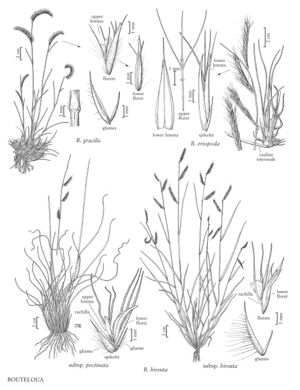Bouteloua gracilis
Plants perennial; usually densely cespitose, often with short, stout rhizomes. Culms 24-70 cm, not woody basally, erect, geniculate, or decumbent and rooting at the lower nodes, not branched from the aerial nodes; nodes usually 2-3, glabrous or puberulent; lower internodes glabrous. Leaves mainly basal; sheaths glabrous or sparsely hirsute; ligules 0.1-0.4 mm, of hairs, often with marginal tufts of long hairs; blades 2-12 (19) cm long, 0.5-2.5 mm wide, flat to involute at maturity, hairs usually present basally. Panicles with 1-3 (6) branches, these racemose on 2-8.5 (12.5) cm rachises or digitate; branches 13-50 (75) mm, persistent, arcuate, scabrous, without papillose-based hairs, with 40-130 spikelets, terminating in a spikelet; disarticulation above the glumes. Spikelets pectinate, with 1 bisexual and 1 rudimentary floret. Glumes mostly glabrous or scabrous, midveins sometimes with papillose-based hairs; lower glumes 1.5-3.5 mm; upper glumes 3.5-6 mm; lowest lemmas 3.5-6 mm, pubescent at least basally, 5-lobed, central and lateral lobes veined and awned, awns 1-3 mm, central awns flanked by 2 membranous lobes; lower paleas about 5 mm, shallowly bilobed, veins excurrent for less than 1 mm; rachilla segments subtending second florets with a distal tuft of hairs; anthers 1.7-2.9 mm, yellow or purple; upper florets sterile, 0.9-3 mm, lobed almost to the base, lobes rounded, 3-awned, awns equal, 1-3 mm. Caryopses 2.5-3 mm long, about 0.5 mm wide. 2n = 20, 28, 35, 40, 42, 60, 61, 77, 84.
Distribution
Alta., B.C., Man., Ont., Sask., Wis., Wyo., Conn., Fla., S.C., N.Mex., Tex., N.Y., Nev., Colo., Calif., Kans., N.Dak., Nebr., Okla., S.Dak., Ill., Iowa, Ariz., Idaho, Maine, Mass., Ohio, Utah, Mo., Minn., Mich., Mont.
Discussion
Bouteloua gracilis grows in pure stands in mixed prairie associations and disturbed habitats, usually on rocky or clay soils and mainly at elevations of 300-3000 m. Its native range extends from Canada to central Mexico; records from the eastern portion of the Flora represent introductions.
Bouteloua gracilis is an important native forage species and also an attractive ornamental.
Selected References
None.
Lower Taxa
"decumbent" is not a number.
